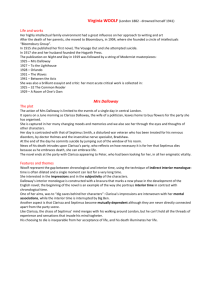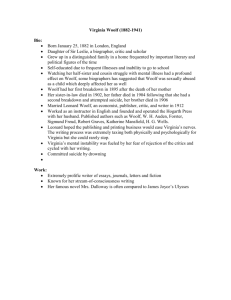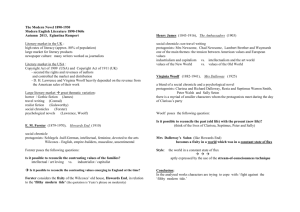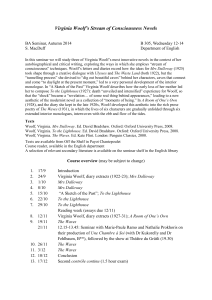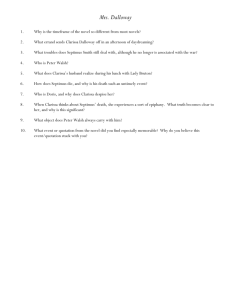A Study of Mrs. Dalloway from the Perspective of Freud's Theory of
advertisement
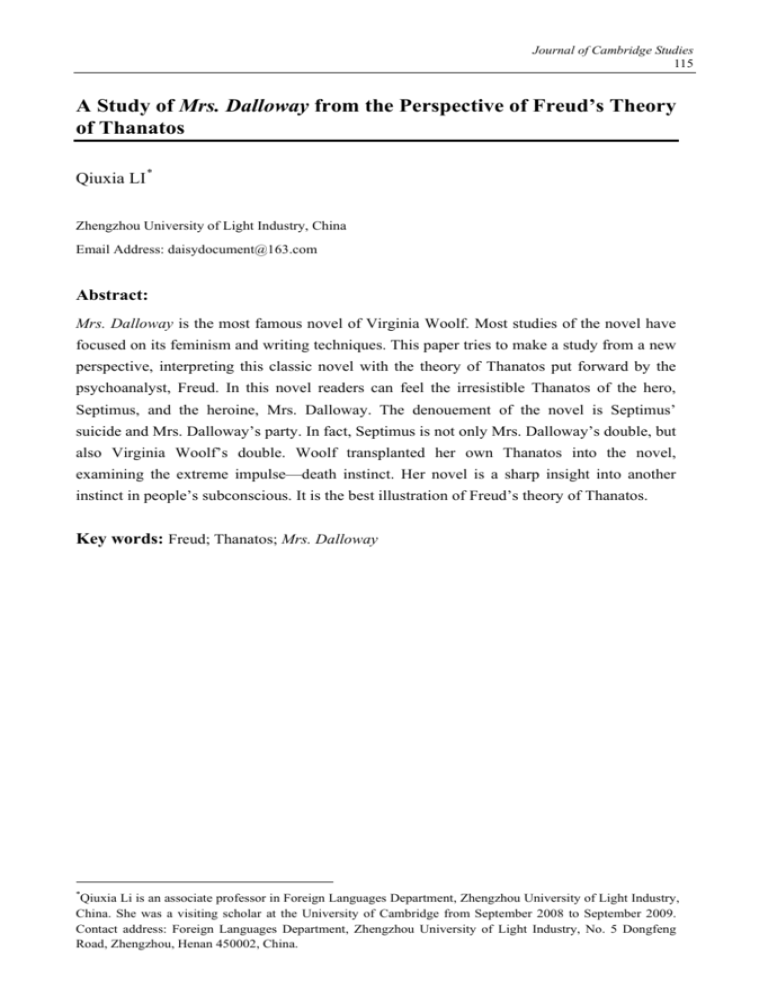
Journal of Cambridge Studies 115 A Study of Mrs. Dalloway from the Perspective of Freud’s Theory of Thanatos Qiuxia LI * Zhengzhou University of Light Industry, China Email Address: daisydocument@163.com Abstract: Mrs. Dalloway is the most famous novel of Virginia Woolf. Most studies of the novel have focused on its feminism and writing techniques. This paper tries to make a study from a new perspective, interpreting this classic novel with the theory of Thanatos put forward by the psychoanalyst, Freud. In this novel readers can feel the irresistible Thanatos of the hero, Septimus, and the heroine, Mrs. Dalloway. The denouement of the novel is Septimus’ suicide and Mrs. Dalloway’s party. In fact, Septimus is not only Mrs. Dalloway’s double, but also Virginia Woolf’s double. Woolf transplanted her own Thanatos into the novel, examining the extreme impulse—death instinct. Her novel is a sharp insight into another instinct in people’s subconscious. It is the best illustration of Freud’s theory of Thanatos. Key words: Freud; Thanatos; Mrs. Dalloway * Qiuxia Li is an associate professor in Foreign Languages Department, Zhengzhou University of Light Industry, China. She was a visiting scholar at the University of Cambridge from September 2008 to September 2009. Contact address: Foreign Languages Department, Zhengzhou University of Light Industry, No. 5 Dongfeng Road, Zhengzhou, Henan 450002, China. Vol. 6, No. 1 March 2011 116 Mrs. Dalloway is Virginia Woolf’s most famous novel. The story consists of two parallel plots: Mrs. Dalloway’s holding a party and the retired soldier, Septimus’ suicide. They have never seen each other, but readers can feel they are coming closer and closer. What bind them together? When Woolf described how she came to write this novel, she wrote, ‘that in the first version Septimus, who later is intended to be her double, had no existence; and that Mrs. Dalloway was originally to kill herself, or perhaps merely to die at the end of her party’(Briggs, 2005, p. 141). In her diary, Woolf wrote, ‘& I adumbrate here a study of insanity and suicide: the world seen by the sane15 and the insane side by side’ (Briggs, 2005, p. 142). Death complex—Thanatos pervades the whole novel. In effect, Septimus is not only Mrs Dalloway’s double, but also the writer, Woolf’s double. Woolf also chose suicide to end her life. This paper tries to interpret the intense desire for death in Mrs. Dalloway with Freud’s theory of Thanatos. 1. A BRIEF INTRODUCTION TO FREUD’S THEORY OF THANATOS Thanatos is a concept put forward by the famous psychoanalyst, Freud. Freud put forward the pair of concepts “Eros” and “Thanatos” in his book Beyond the Pleasure Principle. According to him, Thanatos means ‘an urge inherent in organic life to restore an earlier state of things’ (Freud, 1955, p. 36). Freud thinks the death instinct drives people to death so that they can have real peace, and only death can get rid of tense and struggles. According to Freud’s theory of Thanatos, Death instinct exists in almost everyone’s subconscious. It is an irresistible instinctive power in human beings’ consciousness. Many people may deny that there is a death instinct in their consciousness. Indeed, people’s life instinct is very strong. However, if they examine their flashes of idea in their consciousness, they can find that just like death instinct, their desire for death is sometimes also very strong. For example, in the play Hamlet by Shakespeare, when Hamlet learned that his father was murdered by his uncle and his own mother, he was in such an agony that he sighed, ‘To be, or not to be----that is the question’ (Wang, 2005, p. 8). In addition, when people feel the extreme joy, they want to die and hope time will stop at that moment, which is also the evidence of death instinct, the transformation of life instinct into death instinct. Death instinct is often reflected in attacks and destruction. Outwardly it is expressed in injuring other persons, the summit of which is war; inwardly it is expressed in self-destruction and death. 2. THANATOS IN WOOLF’S CONSCIOUSNESS The word “death” can be found throughout the novel Mrs. Dalloway. It is like a ghost that can not be expelled out of the consciousness of the hero and the heroine. The strong desire for death defies our understanding. Where does the death instinct come from? Is it possible that the writer, Woolf also had the death instinct? Where did the writer’s death instinct derive from? These questions are discussed in the present section. Journal of Cambridge Studies 117 Woolf’s Thanatos is closely related to her folk. Her father’s family had the history of psychosis. Her father was a man of extreme melancholy. When one of his daughters died, he also wanted to die. He walked past her, saying that he wished that he were dead. After his second wife died, he became more depressed. Woolf’s mother was born a melancholy woman. After her first husband died, she became more sad and silent. Woolf’s parents’ melancholy character had a great influence on her and planted the death instinct in her gradually. Woolf’s disease is another source of her Thanatos. Owing to the inheritance of both her father’s and mother’s families, the psychiatric disease had attacked her several times in her life. The spiritual darkness brought her great pain. When she suffered from her first mental breakdown, she almost spoke to herself continually, which lasted for several days. She was lost to all around her. The mental disease led to her depression, despair, and eventually her death instinct. The death instinct is also related to her teenage sufferings. When she was still very young she was taken care of by her step-brother, but suffered from his sexual invasion at the same time. In her biography there was such a record, ‘George himself was more than half unaware of the fact that what had started with pure sympathy ended by becoming a nasty erotic skirmish. There were fondlings and fumblings in public when Virginia was at her lessons and these were carried to greater lengths…’(Bell, 1972. 6, p. 43). ‘Virginia felt that George had spoilt her life before it had fairly begun. Naturally shy in sexual matters, she was from this time terrified back into a posture of frozen and defensive panic’ (Bell, 1972. 6, p. 44). George’s sexual invasion cast a shadow in Woolf’s mind and had a negative influence on her normal marital life. She had an instinctive scare for sex. In 1939, Woolf visited Freud and developed an interest in Freud’s psychiatry, which shows she had mental block. The sexual invasion she suffered had, in part, brought about her depression, melancholy and death instinct. The family tragedy is another factor that causes Woolf’s death instinct. In 1895, her mother died, which caused her first mental breakdown. In 1897, her step-sister, Stella died. In 1904, her father died. In 1905, her brother died. The death of the members of her family wounded her greatly. In great agony, she suffered several mental breakdowns, and attempted suicide. In her diary on October 25, 1920, she wrote, ‘Why is life so tragic; so like a little strip of pavement over an abyss’ (Bell, 1978, p. 72). The two world wars also brought her great trauma. In her diary in 1920, she wrote, ‘Its life itself, I think sometimes, for us in our generation so tragic----no newspaper placard without its shriek of agony from someone. …Unhappiness is everywhere; just beyond the door; or stupidity which is worse’ (Bell, 1978, p. 72-73). In World War II, when she saw London was under the bomb, she wrote to her friend, ‘And then the passion of my life, that is the city of London----to see London all blasted, that too raked my heart’(Bell, 1972. 10, p. 218). Vol. 6, No. 1 March 2011 118 According to the above analysis, the Thanatos reflected in Woolf’s works is the expression of the writer’s desire for death. The writer’s death instinct derived from her family, the society and her teenage sexual sufferings. All these factors made her death instinct become much stronger than her life instinct. In Mrs. Dalloway she expressed her thought that deep in people’s heart, there was something which was buried very deep, and they could not overcome. Probably death is the only way to overcome it. As a result, on March 28, 1941, Woolf drowned herself into the river, freeing herself forever from the unbearable sufferings. 3. WOOLF’S THANATOS TRANSPLANTED IN THE NOVEL MRS. DALLOWAY In Woolf’s Orlando, she wrote, ‘In short, every secret of a writer’s soul, every experience of his life, every quality of his mind is written large in his works (Woolf, 1978, p. 189-190). Indeed, in Mrs. Dalloway, we can see her own shadow. She transplanted her Thanatos into the novel. After Woolf finished each of her novels she would feel a kind of terrible depression. It is said that she destroyed every journal in which she had her works published. Why did she have such a strange response? Why couldn’t she reread her own works? That is because she saw herself in her works. Since Woolf began to conceive Mrs. Dalloway in 1922, she had intended to transplant herself into the novel. She ever said that while Mrs. Dalloway saw the truth, Septimus saw the truth of madness. Septimus and Mrs. Dalloway serve as the different sides of Woolf. They are both the doubles of the writer. The Thanatos of the hero and the heroine is Woolf’s Thanatos transplanted in the novel. The current section presents an analysis of the Thanatos of the three people who are related to each other. 3.1 The source of their Thanatos The story happened after World War I, but the sequela of the war still continued to torture people in spirit for a long time. Woolf’s double, Septimus is a soldier who suffered the trauma of the war. During the war, Septimus had developed the manliness. He learned to repress his feelings. When his best friend, Evans, was killed, he neither revealed any emotion nor realized that he had lost a friend forever. He felt proud of this. After the war, everything in his life had changed. He was unable to appreciate literature; he was unable to love his wife; he couldn’t bear the idea of having a child. This world seemed to be an evil place, which caused despair. He had a headache, insomnia, fear and nightmares. Above all, he couldn’t get rid of the ghost of Evans. Frightened by the explosion in the First World War, he had got a mental disease. After the war, he still lived in fears. The huge noise of the car in the street sounded like the sound of whipping to him. At the same time, those people like Bradshaw forced him to take rest cure, and asked him to separate from his wife. Under the great pressure of fear, Septimus repeated, ‘I will kill myself’ (Woolf, 1992, p. 17). Journal of Cambridge Studies 119 What kind of life did Mrs. Dalloway, another double of Woolf, have? In the novel, when Mrs. Dalloway returned home after she bought the flowers, Woolf described the house as a tomb. The gloomy atmosphere around and people’s hypocrisy and boredom made Mrs. Dalloway feel that life was so empty. She felt, anyhow, there should be a critical centre in life, which was immersed in boring chat in her life. Already in her fifties, she felt her life was idled away. She thought, ‘We are a doomed race, chained to a sinking ship’ (Woolf, 1992, p. 85). The depression and melancholy is also the expression of the writer’s inner feelings. Peter, Mrs. Dalloway’s lover in her early years, couldn’t help thinking of Mrs. Dalloway’s state of illness and agedness when he returned from Mrs. Dalloway’s home. To Peter the bell of St. Margaret seemed to be tolling for the death. There is a common reason for the Thanatos of Septimus and Mrs. Dalloway—they both felt very lonely. Septimus lost his war friend and suffered the spiritual pain alone. While his wife was beside him, she couldn’t really understand him. The doctor who was the symbol of authority wanted to isolate him by force. All these made him feel the awful loneliness of being abandoned. The awful loneliness infected his wife. Though his wife was beside him, he didn’t take notice of her, but looked away, which made her lonely and full of fear. ‘I am alone; I am alone! She cried, by the fountain in Regent’s Park’(Woolf, 1992, p. 26). In a flash of idea, ‘Far rather would she that he were dead’(Woolf, 1992, p. 24-25). According to Apter’s analysis, ‘her desperate isolation is due to the fact that she is not alone, that she is intolerably close to her husband, sharing his awful vision, Septimus makes everything awful for her, even the trees and the sky; she is so much a part of him that his nightmare becomes hers; she wishes him dead because his vision is infectious’ (Apter, 1979, p. 70). Mrs. Dalloway also had a kind of loneliness that she couldn’t get rid of. When she went downtown of London to buy flowers after she had just recovered from her illness, she felt a kind of loss and melancholy though there was a kind of happy atmosphere there. ‘She had a perpetual sense, as she watched the taxi cab, of being out, out, far out to sea and alone; she always had the feeling that it was very, very dangerous to live even one day’ (Woolf, 1992, p. 9). When she returned home, like a nun withdrawing or a child exploring in a tower, she went upstairs. In the attic, she felt ‘there was an emptiness about the heart of life’ (Woolf, 1992, p. 33). Her daughter was taken away by the governess, her husband was invited to Mrs. Bruton’s party, she hardly had contact with her friends in her early years, and her ex-lover fell in love with another woman. At the end of the story, though her party was very magnificent, she withdrew to a small room, pondering death. The source of the Thanatos of the hero and the heroine----war, death, authority and loneliness, is in fact transplanted from Woolf’s Thanatos. Sexual invasion she suffered was transformed into war and authority. The death of her family members was transformed into the death of a war friend. Woolf was also forced to take the rest cure by the doctors, the symbol of authority. Though Woolf’s husband took very good care of her, whenever her mental disease broke out, she felt as if she went into the darkness alone, which was a terrible loneliness that no one could understand. Vol. 6, No. 1 March 2011 120 3.2 The Loss of Eros When the war broke out, Septimus was one of the first soldiers who volunteered to take part in the war. However, after the war ‘Septimus Waren Smith’s confidence in the world of men, in civilization, in human affection, has been shattered in the war’ (Blackstone, 1949, p. 79). Though Septimus had been married with his wife for five years, and his wife wanted a son very much, he refused to have a child. The war deprived him of his ability to love and his Eros. Mrs. Dalloway had reached her menopause. Her narrow bed was just like a tomb. Mrs. Dalloway slept on the white sheet with no one disturbing her. She no longer slept in the same bedroom with her husband, Richard. The sexual life between them had stopped, and she no longer expected the pleasure of sexual love to come back. To a certain degree, Mrs. Dalloway’s lack of sexual desire reflected the change of people’s attitude after the war. This also shows the psychological anxiety World War I brought to people. When we regarded Mrs. Dalloway as a woman in menopause, her connection with Septimus is more obvious. At first, Woolf had conceived that Mrs. Dalloway committed suicide or died at the end of the party. Therefore, in Woolf’s original design, Mrs. Dalloway was a very depressed woman. Mrs. Dalloway was so sensitive to the pain behind the mask of happy atmosphere that she no longer had sexual desire. Both Septimus and Mrs. Dalloway had a kind of anxiety about sex and marriage. The loss of Eros of the hero and the heroine is just transplanted from Woolf’s sexual sufferings in her teenage. The sexual invasion that Woolf had suffered greatly affected her marital life. She and her husband, Ronald were almost spiritual mates. She couldn’t respond to her husband’s desire. She ever said that when her husband kissed her, she felt as if she were a piece of wood. In the novel, the war and the society which worshipped authority, just like the sexual invasion, made Septimus and Mrs. Dalloway dumb and lose their Eros. 3.3 Realization of Death ‘Dying Is an art, like everything else. I do it exceptionally well’(Melander, 1972, p. 105), Sylvia Plath ever wrote. Indeed, death is an art for Woolf. Under the unbearable spiritual pressure, Septimus committed suicide by jumping out of the window when the doctor went into his room. At the same time, Mrs. Dalloway’s party was going on. This is an obvious contrast. On one side is sadness; on the other side is joy. But behind the happy atmosphere of Mrs. Dalloway’s party was hidden the shadow of death. The party is the vigil before the burial. Woolf brought us into the inner mind of various guests. Their fear for old age and death is hidden behind the happy atmosphere and their good manners. To old Mrs. Hilbert, laughter is but the way for her to forget the doom for death. Mrs. Dalloway found that ‘human beings have neither Journal of Cambridge Studies 121 kindness, nor faith, nor charity beyond what serves to increase the pleasure of the moment. They hunt in packs. Their packs scour the desert and vanish screaming into the wilderness’ (Woolf, 1992, p. 98). After a long psychological journey, Mrs. Dalloway got sick of the empty and boring life, and gradually developed the idea of death. That’s why Woolf had wanted Mrs. Dalloway to commit suicide. In the novel, Septimus serves as the double of Mrs. Dalloway. His suicide realized Mrs. Dalloway’s desire for death. After Woolf transplanted her Thanatos into the novel, she also chose suicide. She offered her life to experience the art of death, leaving the beauty of darkness to the reader. 3.4 The Drive for Thanatos What is it that drives Thanatos to conquer Eros for the hero and heroine in Woof’s novel? What is it that drives them to death? What’s the drive for Woolf’s Thanatos? Death is defiance. Septimus challenged authority with his suicide. When Woolf wrote about his challenge to the doctor’ authority, she also transplanted her own unhappy experience. She had been forced to adopt rest cure, which included isolation, complete rest in bed, rich food, being forced to put on weight and no intellectual activities. This was an unbearable and maddening cure, and she hated it. In fact, what those patients needed were some meaningful activities to recover their respect and calmness. Septimus is the victim of medical authority. His suicide, just as Clarissa said, is a heroic challenge. Septimus’ disease reflected the social state then. In that society, the sequela of the war was avoided and people’s feelings were numbed. The British hierarchy produced an exaggerated worship towards authority. The ruling class expected and accepted people’s obedience. Everything was decided by them just like the Big Ben, according to which other clocks adjust themselves. Through suicide Septimus kept his personality independent and intact, acquiring the freedom of his soul. After learning the news of Septimus’ suicide, Mrs. Dalloway retired to the small room, thinking to herself, ‘If it were now to die, ’twere now to be most happy’ (Woolf, 1992, p. 202), and ‘Death was defiance. Death was an attempt to communicate, people feeling the impossibility of reaching the centre which, mystically, evaded them; closeness drew apart; rapture faded; one was alone. There was an embrace in death’ (Woolf, 1992, p. 202). Septimus’ death is also the realization of Mrs. Dalloway’s desire. It is also Mrs. Dalloway’s defiance toward the world and Woolf’s defiance toward the world. Death is salvation. The war is not the only reason for Septimus’ symptoms. His visions, his delusion that he was omnipotent and the sense of sin and martyrdom accompanying it showed that he suffered schiz. A voice was telling him that he was Messiah, ‘the Lord who had come to renew society’ (Woolf, 1992, p. 27). He believed that his voice could bring the trees back to life under some atmosphere. The noise in the street was taken by him an appeal for the birth of a new religion. In his delusion everything seemed to tell him that he was chosen to understand the mysterious truth of life, and convey it to the premier and the Vol. 6, No. 1 March 2011 122 cabinet. The truth is a kind of universal love. The voice called on him to sacrifice himself to save human beings. The news of Septimus’ death came to Mrs. Dalloway’s party. In a sense Septimus also came to the party. He and Mrs. Dalloway met here. ‘Oh! thought Clarissa, in the middle of my party, here’s death’ (Woolf, 1992, p. 201). Mr. Dalloway went into a small room, pondering the young man’s death alone. What’s the significance of Mrs. Dalloway’s party? She thought ‘it was an offering; to combine, to create’ (Woolf, 1992, p. 134), and ‘it was her gift’ (Woolf; 1992, p. 134). On the altar was offered Septimus----Mrs. Dalloway’s double, a Christ who came to save human beings. Before Woolf drowned herself in the river, she left a letter to her husband, in which she wrote ‘…So I am doing what seems the best thing to do….I don’t think two people could have been happier till this terrible disease came. …I know that I am spoiling your life, that without me you could work. And you will I know….I can’t go on spoiling your life any longer’ (Bell, 1972. 10, p. 226). Woolf freed herself and relieved her beloved with her death. She transplanted the salvation into her novel. In the novel it was transformed into the universal love to save all human beings. 4. CONCLUSION Thanatos and Eros are the two irresistible instinctive forces in people’s subconscious. In the extreme pain and pressure, Thanatos can overcome Eros. The Thanatos in Mrs. Dalloway was transplanted from Woolf’s own Thanatos. Woolf’s Thanatos derived from her family and society. She illustrated the art of death with her death and her works. Mrs. Dalloway is a sharp insight into people’s subconscious and the best illustration of Freud’s theory of Thanatos. Journal of Cambridge Studies 123 REFERENCES [1]Apter, T. E., 1979, Virginia Woolf: A Study of her Novels, London: The Macmillan Press Ltd. [2]Bell, A. O., ed., 1978, The Diary of Virginia Woolf: Volume II: 1920-1924, London: The Hogarth Press Ltd. [3]Bell, Q., 1972, Virginia Woolf: A Biography: Volume I, London: The Hogarth Press Ltd. [4]Bell, Q., 1972, Virginia Woolf: A Biography: Volume II, London: The Hogarth Press Ltd. [5]Blackstone, B., 1949, Virginia Woolf: A Commentary, London: The Hogarth Press Ltd. [6]Briggs, J., 2005, Virginia Woolf: An Inner Life, London: Penguin Books Ltd. [7]Freud, S., 1955, Beyond the Pleasure Principle, London: The Hogarth Press Limited. [8]Melander, I., 1972, The Poetry of Sylvia Plath: A Study of the Themes, Stockholm: Almqvist & Wiksell. [9]Wang, S., 2005, Selected Readings in British Literature, Beijing: Higher Education Press. [10] Woolf, V., 1978, Orlando, London: The Hogarth Press. [11] Woolf, V., 1992, Mrs. Dalloway, London: Penguin Books Ltd.

